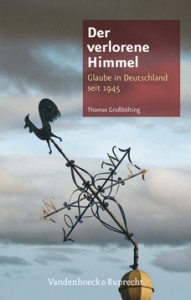Review of Thomas Grossbölting, Der verlorene Himmel. Glaube in Deutschland seit 1945
Contemporary Church History Quarterly
Volume 19, Number 4 (December 2013)
Review of Thomas Grossbölting, Der verlorene Himmel. Glaube in Deutschland seit 1945 (Göttingen: Vandenhoeck & Ruprecht, 2013), Pp. 320.
By Manfred Gailus, Technische Universität Berlin
This review appeared originally (in German) in Der Taggespiegel (1 July 2013). Our thanks to John S. Conway for his translation. The original can be found here: http://www.tagesspiegel.de/kultur/land-ohne-himmel/8426976.html
What do Germans today still believe in and how? Can we still talk of this being a “Christian country”?
 Thomas Grossbölting, who teaches at the University of Münster, poses these questions and puts them in the context of faith, church and religion after the catastrophe of National Socialism in Germany. This well researched study can be seen as the first up-to-date history of religion in the Federal Republic of Germany. His basic thesis is clear and hardly surprising. Anyone examining how and what Germans have believed in the past fifty years has to take note of a striking decline in the significance of religious consciousness. Although, in recent years, some observers have claimed that there has been a so-called religious revival, in fact anyone taking a longer view over the past five or six decades must conclude that a far-reaching secularization has taken place. The very idea of Heaven has been lost. As the author crucially points out in his introduction: “A Christian Germany no longer exists”. On the other hand, the elements of faith, church and religion have not disappeared from daily life in Germany. Rather they have been thinned out, pushed to the edge of society, and in many people’s lives they are completely or largely absent.
Thomas Grossbölting, who teaches at the University of Münster, poses these questions and puts them in the context of faith, church and religion after the catastrophe of National Socialism in Germany. This well researched study can be seen as the first up-to-date history of religion in the Federal Republic of Germany. His basic thesis is clear and hardly surprising. Anyone examining how and what Germans have believed in the past fifty years has to take note of a striking decline in the significance of religious consciousness. Although, in recent years, some observers have claimed that there has been a so-called religious revival, in fact anyone taking a longer view over the past five or six decades must conclude that a far-reaching secularization has taken place. The very idea of Heaven has been lost. As the author crucially points out in his introduction: “A Christian Germany no longer exists”. On the other hand, the elements of faith, church and religion have not disappeared from daily life in Germany. Rather they have been thinned out, pushed to the edge of society, and in many people’s lives they are completely or largely absent.
Grossbölting describes this transformation in religious life as taking place in three stages, to each of which he devotes an appropriate chapter. Firstly, there were the immediate post-war years, the so-called Adenauer era, when the old established Christian world still seemed to be at least partially in order, but which now looks really archaic. There followed the Swinging Sixties when the younger generation with their Beatles, their mini-skirts, their love of Karl Marx, and their rebellious behaviour in 1968, constituted a revolutionary change in life-styles. This was a turbulent period which saw a striking abandonment of religious customs and traditions. Finally, in the most recent decades, we have seen a further lessening of the ecclesiastical structures in both the major churches which used to possess a religious monopoly. Today the country is increasingly taking on the character of a multi-religious society. Amongst the most notable features in the religious statistics of this latest phase are the unstoppable growth of “non-confessionalists’, as well as the increase in the portion of the population which adheres to Islam, and the numerous colourful but often short-lived new religious movements. “From Church to Choice” may be an appropriate slogan for these dramatic changes, whereby individuals move from inherited church-going patterns to personal choices of faith and denomination.
The reader will surely be able to evaluate the main lines of this well-researched and convincingly argued study. But the author’s Catholic perspective should not be forgotten, which leads him to overlook certain scandalous aspects in the Catholic milieu. It is hardly justifiable that such a notable critic as Rolf Hochhuth, whose drama “The Deputy” aroused such a stir in the 1960s, should be ignored. And in fact this study concentrates primarily on West Germany, so that the religious developments in East Germany are cursorily treated at the end of the volume. Furthermore, the author’s treatment of the long shadow of National Socialism and the churches’ problematic responses during the Nazi era from 1933 to 1945 is too abridged. This experience was a fateful epoch whose repercussions in the post-war world were, and to some extent still are, a dire legacy. But, at the same time, this attempt to give us a religious history of Germany since 1945 can be seen as a successful and well-informed survey.
